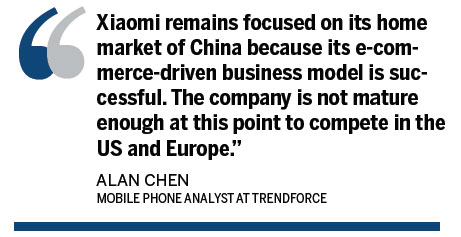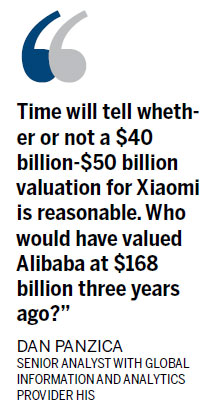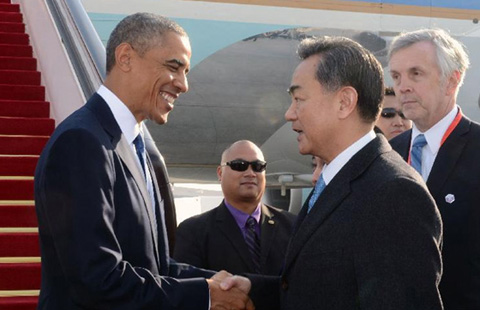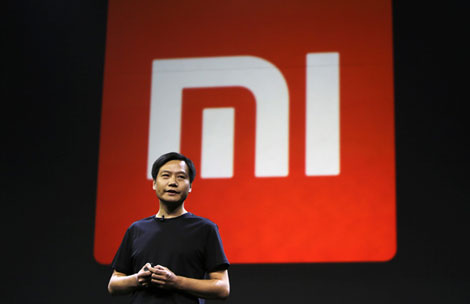Is Xiaomi ready for Western markets?
Updated: 2014-11-07 07:35
By PAUL WELITZKIN in New York(China Daily USA)
|
||||||||
Chinese smartphone maker Xiaomi, which went from releasing its first unit in 2011 to one of the world's biggest sellers, would have difficulty competing in Western and mature markets like the United States, according to analysts.
The company, which is pursuing expansion into markets from Singapore to India, reportedly is in talks to secure financing – as much as $1 billion, according to The Wall Street Journal – for greater overseas expansion or acquisitions.

Xiaomi sells Android-based phones directly to consumers rather than through an agent or carrier, usually charging about half what competitors charge.
Asked by China Daily if Xiaomi could make it in the US and Western markets, responses from the analysts ranged from not "a chance" to it would be a challenge.
"The company is more like an Amazon rather than an Apple or Samsung. It invests very little in marketing, and with this strategy it would not stand a chance in operator-driven markets (like the US and Western Europe)," said analyst Ryan Reith of International Data Corp (IDC).
Xiaomi isn't in US or Western markets because of strategic reasons, he wrote. "These are markets that are driven by highly subsidized phone sales, as well as a requirement for phone vendors to heavily invest in brand marketing. This isn't Xiaomi's game plan. They are more focused on low overhead and low-cost markets where they can sell a lot of devices – at low margin – that will ultimately lead to services revenue."
Reith said that Xiaomi sells an enormous amount of content via its devices, which has led the company to become the third-largest e-commerce company in China.

Mobile phone analyst Alan Chen of TrendForce noted that Xiaomi depends on China for more than 90 percent of its shipments and has become one of the world's top-five handset vendors.
"Xiaomi remains focused on its home market of China because its e-commerce-driven business model is successful. The company is not mature enough at this point to compete in the US and Europe," he wrote in an email. "Xiaomi could develop an online sales model for Europe and the US, but should expect that results would be limited. We believe its overseas expansion in 2015 will be focused on Asia and other emerging markets."
Dan Panzica, senior analyst with global information and analytics provider IHS, said the company's phones can compete with the best Android phones in the world.
"The difference is that they sell directly to customers from their website. When the Mi 4 went on sale in Singapore, it sold out in minutes. They also make significant revenues from accessories. Xiaomi definitely has the products to compete in the USA and Europe. However, they do not have the relationships with the carriers, which could hold them back," he said.
In addition to the Chinese mainland, Xiaomi's phones are on sale in Hong Kong, India, Indonesia, Malaysia, Philippines, Singapore and Taiwan. It hopes to launch in Brazil, Mexico, Thailand, Turkey and Vietnam soon, according to Chris Jones, vice-president and principal analyst at data tracker Canalys in Palo Alto, California.
"Xiaomi is using social media and online channels to drive demand for sales when the devices are made available," Jones said. "But international expansion, as Xiaomi is experiencing, takes time and serious investment. The markets it picked to go to first are markets with high growth potential. More mature markets that are carrier-led (most phones are distributed by carriers) and have strong incumbent players (like Apple) such as the US and parts of Western Europe will be more of a challenge."
Bloomberg News reported recently that Xiaomi was looking to raise money with a valuation of $40 billion to $50 billion. Such a valuation would make the company more valuable than more established and well known competitors like Sony Corp and Lenovo Group Ltd, which just acquired Google's Motorola unit.
"It is difficult to say based on Xiaomi's current achievements if it is worth ($40 billion to $50 billion), but what is for certain is that all this talk of the company's valuation has succeeded in further raising Xiaomi's brand awareness," said Chen.
"Time will tell whether or not a $40 billion-$50billion valuation for Xiaomi is reasonable. Who would have valued Alibaba at $168 billion three years ago?" said Panzica of IHS.
paulwelitzkin@chinadailyusa.com
- Li's Myanmar tour to open new chapter in China-ASEAN ties
- Premier Li suggests greater China-Chile trade cooperation
- President Xi lends support for HK
- China plans to launch about 120 applied satellites
- Tiny apartment near desirable school fetches huge price
- Xi calls for mutual trust, respect across Taiwan Straits

 Obama arrives in Beijing for APEC meeting, state visit
Obama arrives in Beijing for APEC meeting, state visit
 'Friendship mode' key in China relations
'Friendship mode' key in China relations
 Herdsmen of Tajik ethnic group play traditional game
Herdsmen of Tajik ethnic group play traditional game
 Singles' Day sales that reveals a lot
Singles' Day sales that reveals a lot
 Scenery of APEC venue Yanqi Lake in Huairou District
Scenery of APEC venue Yanqi Lake in Huairou District
 Xiaomi to raise $1.5b in latest funding boost
Xiaomi to raise $1.5b in latest funding boost
 Official: badminton world No. 1 fails dope test
Official: badminton world No. 1 fails dope test
 Gala celebrates USCPFA's 40th anniversary in Houston
Gala celebrates USCPFA's 40th anniversary in Houston
Most Viewed
Editor's Picks

|

|

|

|

|

|
Today's Top News
Alibaba’s '11/11' opening sales break record
Hershey hits sweet spot in China market
Rape of Nanking author recalled at service
What's in a name? A free trip around globe
Surprise as Mexico rail contract withdrawn
UN chief hails DPRK's release of two US citizens
BYD unveils new electric bus in Brazil
UnionPay enters Suriname market
US Weekly

|

|







